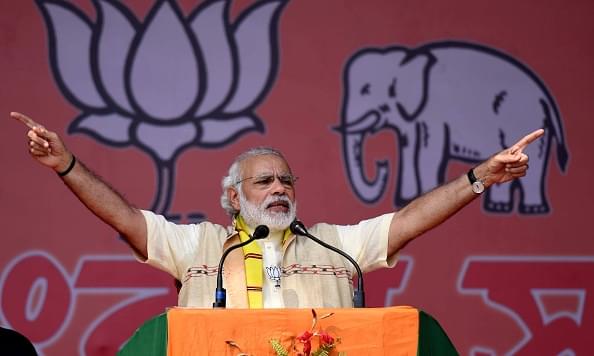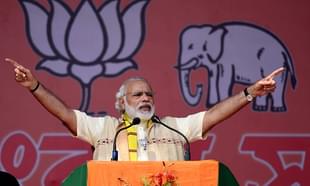Politics
Intellectuals In Muddy Assam Polls
Nava Thakuria
May 04, 2016, 12:24 PM | Updated 12:24 PM IST
Save & read from anywhere!
Bookmark stories for easy access on any device or the Swarajya app.


Seasoned politicians often make and break news during election time, but a section of Assamese intellectuals has recently emerged as the creator of noise and news just ahead of the Assembly polls. The group of over 40 intellectuals (read academician, author, socio-cultural activist, journalist etc) made an appeal to the electorate not to vote for a particular political party in the state polls. The move, however, backfired in the alternate media.
Led by noted author Hiren Gohain, the group organised a press conference in Guwahati to term the Bharatiya Janata Party (BJP) a fascist and communal entity and urged the electorate to stand against the saffron party in the Assembly elections held on 4 and 11 April.
The anti-BJP campaigners including distinguished poets Nalinidhar Bhattacharya, Nilamoni Phukan, columnists Nirupama Bargohain, Anima Guha, former college principals Udayaditya Bharali, Dinesh Baishya, socio-cultural activists Sitanath Lahkar, Loknath Goswami, Shivanath Barman, Akhil Ranjan Dutta, Sanjoy Borbora etc. They termed the saffron party as the ‘primary and biggest enemy of the people’ and urged everyone to prevent the BJP in its march for power at Dispur.
As the Guwahati-based satellite news channels beamed the news, harsh reactions against these intellectuals started pouring in. The outspoken BJP leader Himanta Biswa Sarma commented critically against the group saying that they were actually leftist intellectuals (read not impartial intellectuals) and the electorate of Assam would never listen to their campaign against the pro-development party.
Parliamentarian Ramen Deka, who is also a national secretary of BJP, accused Gohain for indirectly campaigning for the candidates of Congress and AIUDF in the poll fray. He also appealed to the electorate not to pay attention towards the intellectuals’ diktat.
Instant sharp reactions also came from senior journalist Dhirendra Nath Chakrabarty, who termed the appeal of those intellectuals as a paid statement (similar to paid news). Saraswati Sanman awardee author Lakshi Nandan Bora and former bureaucrat Rohini Barua also expressed their annoyance that a section of intellectuals gratuitously tried to dictate to the electorate of the state.
Meanwhile, the Indigenous Tribal Sahitya Sabhas of Assam issued a statement with strong words against Gohain and his team for their motivated appeal. The literary forum also targeted Krishak Mukti Sangram Samity leader Akhil Gogoi for indirectly asking the voters to support the ruling Congress, which has been protecting illegal Bangladeshi migrants in the region.
They ridiculed Gohain for organizing the press conference and stated that Indian democracy allows every single citizen to cast his/her vote according to their conscience. Hence the intellectuals’ unwanted appeal to the electorate was an interference in people’s right to cast their votes, asserted the forum.
The debate gained momentum as more prominent citizens came out with their resentment at the appeal made by Gohain and his team just two days before the first phase of Assembly polls. Acclaimed academician and former Gauhati University vice-chancellor Nirmal Kumar Choudhury with former Assam police chief Nishinath Changkakoti criticized the stand taken by those intellectuals.
“Asking people not to vote for a particular party is in itself a threat to democracy. Nobody has the right to issue a fatwa to the electorate on exercising their franchises. They are trying to mislead the voters on the eve of polling day,” said a statement signed by Choudhury, Changkakoti with few others.
They also urged the electorate of Assam to come out in large number to give their mandates without any fear or under any kind of influence.
A similar appeal was made by non-political organization Loka Jagaran Mancha, which urged everyone to cast their vote to make it a cent percent turnout. Amazingly, Assam recorded over 82 percent of polling in both phases of the Assembly elections.





